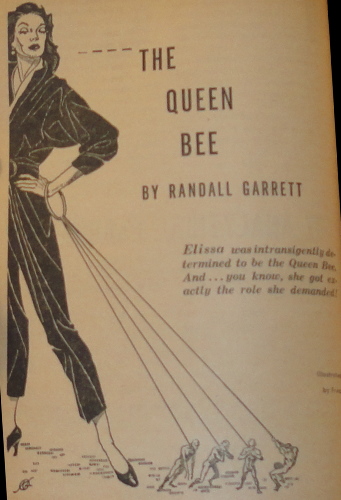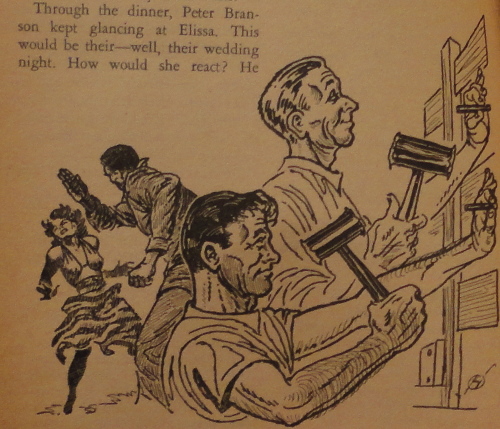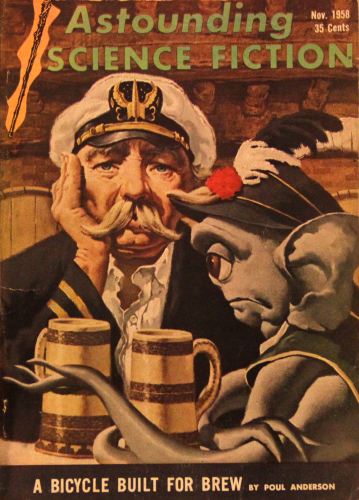
I'm willing to concede that we (currently) live in a “man's world.” Men make up most of the protagonists and characters in science fiction, and the vast majority of science fiction authors are men. This month's Astounding does not buck this trend–virtually every story has no, or at best a token, female presence. I suppose I should be grateful for this, however, as I would rather have no women in my stories than see them horribly mistreated and poorly portrayed, as I saw happen rather gratuitously in the second half of the magazine.
But I'm getting ahead of myself.
Poul Anderson's “Bicycle Built for Brew” ended as it started with a fine premise, an interesting if whimsical storyline, and horrible execution. The resourceful engineer of the Mercury Girl managed to escape from the occupied planet by fashioning a ship from a sealed crate and several barrels of beer (providing the reaction mass for propulsion). The national and gender stereotypes were tired by page 2 of the last installment, and they don't get better here. All's well that ends, and I was happy to see this story finish.
Miller's pre-book-review column focused on UFOs, which are still popular. I remember reading in an Asimov or Ley article that the number of UFO sightings climbed sharply in the late '40s coincident with the testing of new jets and sounding rockets. At the same time, the number of reported demonic encounters dropped dramatically. You may draw your own conclusions from this.
“Seller's Market,” by Chris Anvil, is another inconsequential but readable story of the type that has characterized his writing since he started. It depicts a small military force on a harsh planet as it struggles against a nominally superior but fatally flawed foe.
And now, I can put it off no longer. The story that ruined my morning and my impression of Randall Garrett, and by extension, Astounding magazine: “Queen Bee.”
I don't think misogyny can adequately convey the sentiment in this story. “Hatred of women,” may get closer to the mark. The setting of the story was interesting-enough: Four men and three women marooned on a wild planet for life. However, the story begins with the viewpoint character hitting a woman (she was hysterical, of course), and it goes downhill from there.
It is decided, pursuant to codified law (!) that the males and females must breed constantly and switch partners each time such that a colony with a maximum of genetic diversity can be produced. One of the women, the only married one, seems fine with this, much to the consternation of her old-fashioned husband. The other two women resist the idea for some reason. One of them is diagnosed by the resident doctor as a “man-hater,” and the other is a Taming of the Shrew Kate-type character. That's all right–the male characters beat sense into them, quite literally. The man-hater, after being walloped a good one realizes the error of her ways and becomes pregnant shortly thereafter.

But the other hold-out won't budge despite several clouts and a full course of spanking (!!) Eventually, she kills the other two women so that she, as the only woman, can enjoy an indispensable (and perhaps beating-free) status. Given the circumstances, I'm not sure that I find her actions unreasonable. Of course, the men are horrified, and they exact a horrible revenge… er… mete out appropriate justice. They hold a trial and find her not guilty by reason of insanity.
And then they lobotomize her, turning her into a mindless child-bearing factory.
What is so maddening about this story is its contrast with Judith Merril's story in this month's F&SF. The set-up is quite similar, except the women don't have to resort to constant brutality to keep the men-folk in line. One could argue that the arrangement in Merril's story was consensual and thus a whole different matter. This only emphasizes the horror of Garrett's scenario: the women in his story didn't sign up to be mothers of a colony. They certainly never agreed to be dominated and brutalized by their fellow castaways.
Perhaps, if the story had been meant as satire, I could have taken it. But I think Randy Garrett's premises, that men should automatically be in charge, that a woman's duty is to bear children, and violence against women is the best method to keep them in line, must ring natural and true to Mr. Garrett, to Mr. Campbell, and if the readers of Astounding do not subscribe to them, I imagine they do not generally find them egregious.
Well, I did. This is worse than the story that turned me off of Venture ("Eve and the Twenty-Three Adams" by Robert Silverberg; the set-up was similar–in that one, all starships came equipped with a ship's whore, and when the story's ship's whore wouldn't perform, the Captain drugged her up so that she could fulfill her role while unconscious). Garrett's lost me as a fan, and I am sending a copy of this article straight to Mr. Campbell.
Sorry to end this piece on a down note. I will hopefully have cheerier things to discuss next time around. The final score: 4 stars for the first half, 1.5 stars for the second, 2.25 for the whole magazine.
(Confused? Click here for an explanation as to what's really going on)
This entry was originally posted at Dreamwidth, where it has comments. Please comment here or there.

